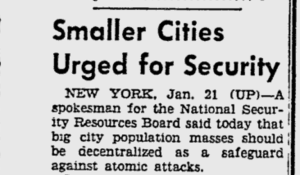
The postwar period was all about decentralization. During World War II, we saw the destruction that could be wrought with a single bomb on a high value target. Cuz, you know, we dropped a whole lot of those bombs ourselves.
Previously, our missiles and bombers were manufactured in coastal cities like Seattle and San Francisco and Los Angeles, a natural extension of naval shipyards. After the Soviets developed nuclear submarines, coastal cities started looking like a very bad place to be.

The best way to avoid getting bombed is to have nothing worth bombing. President Truman established the National Industrial Dispersion Policy and awarded big defense contracts contingent on relocation to flyover states. Boeing moved B-52 manufacturing facilities to Wichita and Omaha. As far as nuclear attack targets go, Wichita ranks pretty low on the list. Most people can’t even find it on a map.

Then there’s ARPANET. Operating under the assumption that we would get nuked (so much optimism!), the military commissioned research into a communications system that would survive an atomic bomb. Yes, it would be terrible if we got blown to pieces and the Pentagon wanted to command a counterattack but the phone lines were dead.
Centralized switchboards and telegraph lines can be knocked down, but a distributed communications network routes around failure. The initial ARPANET was literally four modems connected through long-distance telephone calls.

Things tend toward centralization. Blame economies of scale and inertia. Today, 70% of global internet traffic passes through an Internet Exchange Point in Northern Virginia, where Amazon had its datacenter failure on Tuesday. And everyone’s crammed into the coastal cities again.
Given the imminent threat of nuclear war, I hereby urge President Trump to sign a new Dispersion Policy that relocates Google and Facebook out of the San Francisco Bay Area and over to Wichita. Palantir should be dispersed to an offshore oil rig. Hurry, national security is at stake!
Nice post Elaine thanks. Don’t forget that the vulnerability of the hugely centralised Google and Facebook (plus, what, 20% of the US economy?) is also seismological.
Just some thoughts on centralisation vs decentralisation. A lot of this is fashion. Every 10 years or so a management guru will write a book uriging that we do one of those things, oppostite to what the last guru said. There is a massive social/mental cycle that swings between the two ideas. Governments and corporations will alternately decentralise their workforces (because it’s best to be near the markets or constituents) and bring them back to head office (because it’s more economical or more co-ordinated). It would be wise to recognise that some aspects of society and indeed the human condition itself cannot be optimised as if they are pure machines. We might have to get better at holding contradictory beliefs at the same time. We can have stand-up meetings AND telecommuting!
And then there’s physics, and ecology.
If centralisation seems to win in the long run, it may be because it’s the lowest energy state. Decentralisation is expensive to maintain, and, in the extreme, can seem artificial. Look at AirBnB brokers. The emergence of intermediaries in the sharing economy shocks the hippies but to keep them out requires a paradoxical effort in rule-making. Or look at blockchain and the concentation of miners, something the idealist Nakamoto seemed never to have thought of. Seems that central rules are going to be neeed afterall to keep the anti-establishment blockchain afloat.
Intermediaries evolve in business ecosystems for the same reason new species emerge in nature: organisms find new ways to make a living which bestow survival advantage, and thus they prosper. Centralisation is literally a force of nature.
Has any corporation actually volunteered to decentralize their workforce without government incentives? They sometimes expand into new locations & markets, but I do agree that centralization is the lowest energy state.
I think Bitcoin miners are self-limiting, out of interest in protecting their investments. One miner got over 51% hashpower in 2014 (https://arstechnica.com/security/2014/06/bitcoin-security-guarantee-shattered-by-anonymous-miner-with-51-network-power/), but quickly scaled back so that users would still feel like they could trust the network.
Hmm. I wonder how many of the things that seem decentralized are actually totally centralized but try to give the outward appearance of decentralization to gain trust. Govt, media…
Decentralized social networks already exist.
https://diasporafoundation.org/
https://gnu.io/social/
> If centralisation seems to win in the long run, it may be because it’s the lowest energy state.
@Steve Wilson
That assumes that efficiency is the reason for centralization.
Can you think of another reason?